2023年冀教版中考英语二轮复习 第二章 语法精讲 第十一课时 非谓语动词课件(共43张PPT)
文档属性
| 名称 | 2023年冀教版中考英语二轮复习 第二章 语法精讲 第十一课时 非谓语动词课件(共43张PPT) |  | |
| 格式 | pptx | ||
| 文件大小 | 569.1KB | ||
| 资源类型 | 教案 | ||
| 版本资源 | 冀教版 | ||
| 科目 | 英语 | ||
| 更新时间 | 2023-05-23 19:36:26 | ||
图片预览


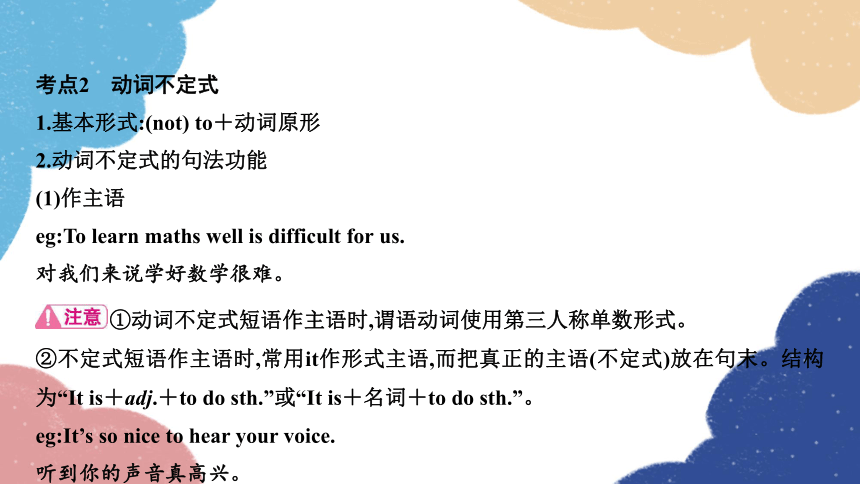

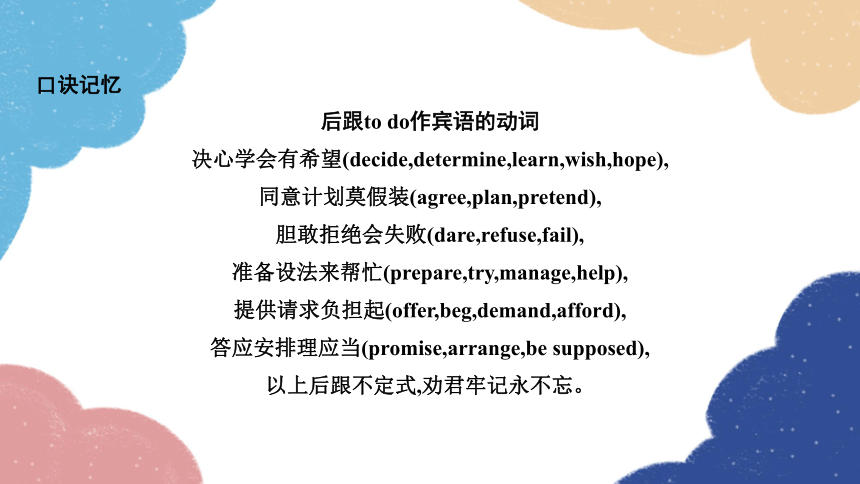
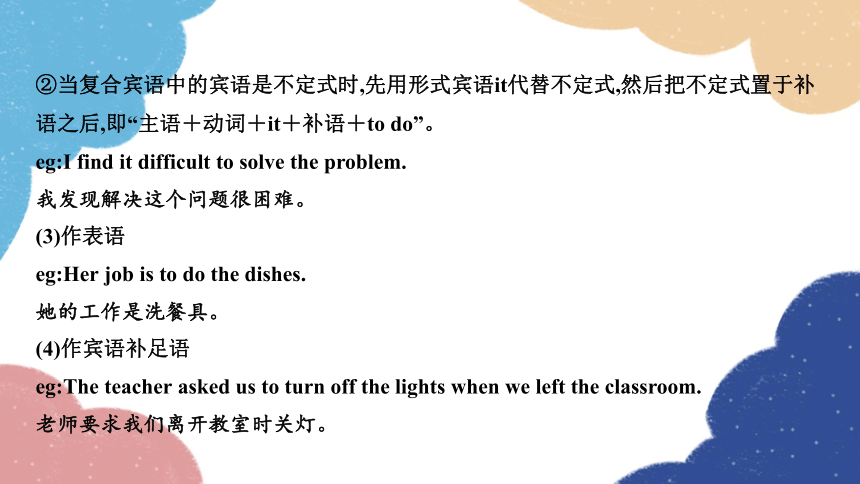
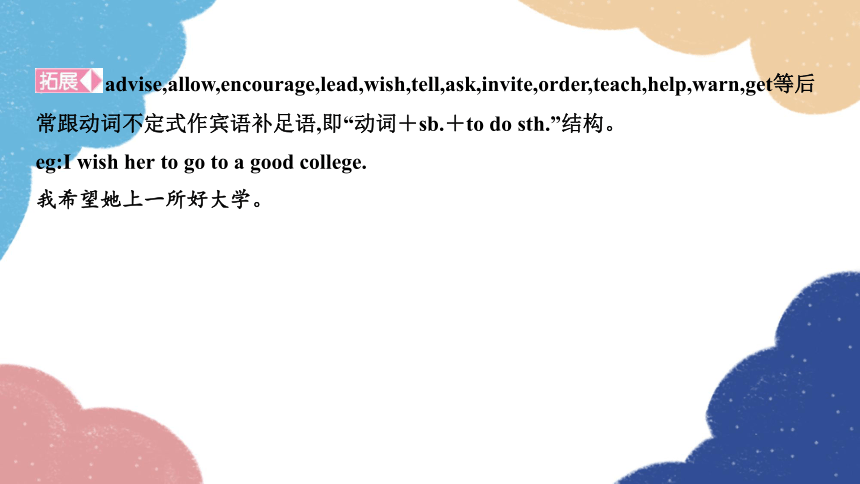
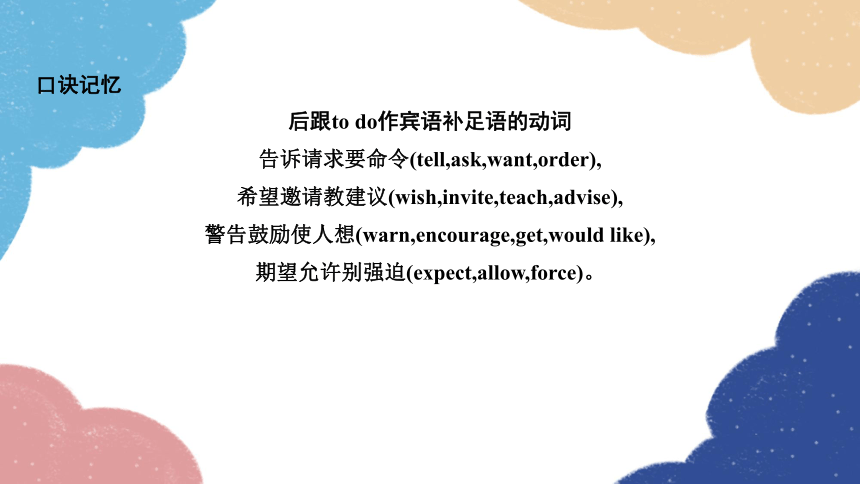
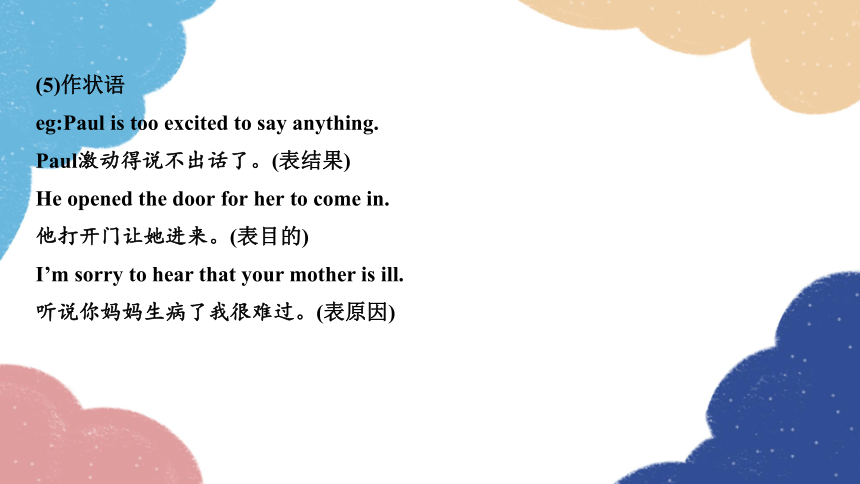

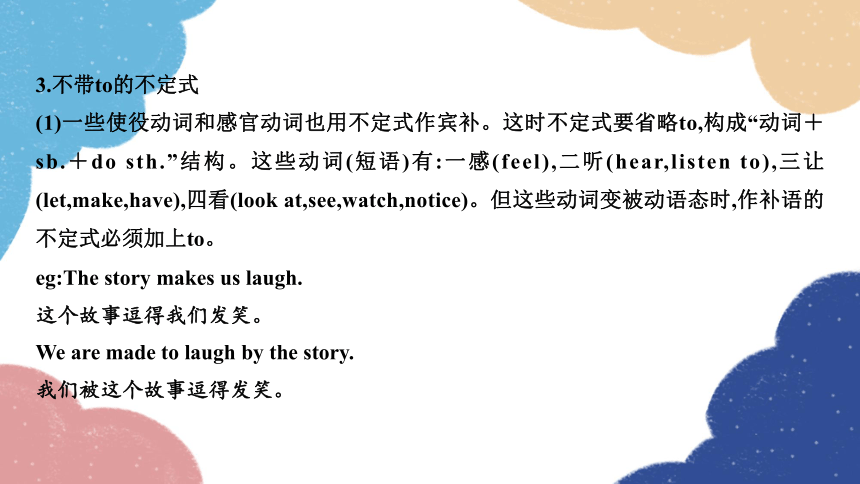

文档简介
(共43张PPT)
第十一课时 非谓语动词
第二章 语法精讲
考点分类
考点1 非谓语动词的定义与分类
非谓语动词是指在句子中起名词、形容词或副词作用,充当除谓语以外的各种句子成分的动词形式。非谓语动词不能单独作谓语,可以充当主语、宾语、状语等。非谓语动词有三种形式:动名词、动词不定式、分词(现在分词和过去分词)。
分析近5年甘肃中考真题可知,非谓语动词属于必考点,重点考查动词不定式和动名词,也会涉及过去分词。涉及的题型主要有单项选择、完形填空、词汇考查、动词考查、句型转换和任务型完形填空。
考点2 动词不定式
1.基本形式:(not) to+动词原形
2.动词不定式的句法功能
(1)作主语
eg:To learn maths well is difficult for us.
对我们来说学好数学很难。
①动词不定式短语作主语时,谓语动词使用第三人称单数形式。
②不定式短语作主语时,常用it作形式主语,而把真正的主语(不定式)放在句末。结构为“It is+adj.+to do sth.”或“It is+名词+to do sth.”。
eg:It’s so nice to hear your voice.
听到你的声音真高兴。
(2)作宾语
eg:They decided to visit the Great Wall.
他们决定去游览长城。
①只能接动词不定式作宾语的动词(短语)有:want,would
like,pretend,afford,offer,agree,happen,choose,decide,expect,fail,hope,manage,wish,seem,plan,prepare,promise,refuse等。
口诀记忆
后跟to do作宾语的动词
决心学会有希望(decide,determine,learn,wish,hope),
同意计划莫假装(agree,plan,pretend),
胆敢拒绝会失败(dare,refuse,fail),
准备设法来帮忙(prepare,try,manage,help),
提供请求负担起(offer,beg,demand,afford),
答应安排理应当(promise,arrange,be supposed),
以上后跟不定式,劝君牢记永不忘。
②当复合宾语中的宾语是不定式时,先用形式宾语it代替不定式,然后把不定式置于补语之后,即“主语+动词+it+补语+to do”。
eg:I find it difficult to solve the problem.
我发现解决这个问题很困难。
(3)作表语
eg:Her job is to do the dishes.
她的工作是洗餐具。
(4)作宾语补足语
eg:The teacher asked us to turn off the lights when we left the classroom.
老师要求我们离开教室时关灯。
advise,allow,encourage,lead,wish,tell,ask,invite,order,teach,help,warn,get等后常跟动词不定式作宾语补足语,即“动词+sb.+to do sth.”结构。
eg:I wish her to go to a good college.
我希望她上一所好大学。
口诀记忆
后跟to do作宾语补足语的动词
告诉请求要命令(tell,ask,want,order),
希望邀请教建议(wish,invite,teach,advise),
警告鼓励使人想(warn,encourage,get,would like),
期望允许别强迫(expect,allow,force)。
(5)作状语
eg:Paul is too excited to say anything.
Paul激动得说不出话了。(表结果)
He opened the door for her to come in.
他打开门让她进来。(表目的)
I’m sorry to hear that your mother is ill.
听说你妈妈生病了我很难过。(表原因)
(6)作定语
eg:I have a lot of books to read.
我有很多书要读。
如果动词不定式中的动词是不及物动词,所修饰的名词或代词是地点、工具等时,切记不能忘掉介词;如果不定式修饰time,place,way时,可以省略介词。
eg:He found a good house to live in.
他发现了一个居住的好房子。
He has no place to live.
他无处安身。
3.不带to的不定式
(1)一些使役动词和感官动词也用不定式作宾补。这时不定式要省略to,构成“动词+sb.+do sth.”结构。这些动词(短语)有:一感(feel),二听(hear,listen to),三让(let,make,have),四看(look at,see,watch,notice)。但这些动词变被动语态时,作补语的不定式必须加上to。
eg:The story makes us laugh.
这个故事逗得我们发笑。
We are made to laugh by the story.
我们被这个故事逗得发笑。
(2)在would you please,had better,would rather等结构后,需用不带to的不定式。
eg:Would you please make your bed
你能整理一下你的床铺吗
You’d better go to bed earlier.
你最好早点上床睡觉。
(3)当介词but,except,besides前有否定的不定代词nothing,nobody等时,其后接不带to的动词不定式。
eg:He could do nothing but wait.
除了等待他什么也做不了。
(4)两个并列的带to的不定式由and或or 连接时,第二个不定式符号to常常省略。
eg:I don’t want to visit my friend or ask him any questions.我不想去看望我的朋友,也不想请教他任何问题。
4.疑问词+动词不定式
动词不定式可以用在疑问词what,how,when,where,which等之后在句中起名词作用,作主语、宾语或宾语补足语。
eg:It’s a question how to get there.
怎样到那儿是个问题。
在与why或why not开头的简短疑问句连用时,后面紧跟的动词不定式不带to。
eg:Why not have a rest =Why don’t you have a rest 为什么不休息一下呢
5.不定式的常用句式
(1)too...to...表示“太……而不能……”。
eg:The boy is too young to look after himself.这个男孩太小了,没法照顾自己。
(2)enough to...表示“足够……”。
eg:He is old enough to go to school.
他足够大了,可以上学了。
(3)prefer to do sth.rather than do sth.表示“宁愿做某事而不愿做某事”。
eg:I prefer to do some sports rather than stay at home.
我宁愿做运动也不愿待在家里。
(4)“It takes sb.some time to do sth.”表示“某人花费一些时间做某事”。
eg:It took me three hours to repair the TV set.修电视花了我三个小时。
(5)“It is+adj.+for/of sb.to do sth.”表示“做某事对于某人来说很……/某人这么做真的是太……了”。
eg:It is easy for her to learn English well.
对她来说学好英语很容易。
It’s very kind of you to help me with my English.你帮我学英语真是太好了。
当形容词是可以修饰人的形容词(如kind,friendly,good等)时后面用介词of,其他不能修饰人的形容词后面用介词for。
( A )①Every morning,Tim often sees some groups of middle-aged women in the square.
A.dance B.to dance
C.dances D.danced
( C )②Please remember your notebook here tomorrow.
A.brings B.bring
C.to bring D.bringing
A
C
考点3 动名词
1.动名词的形式:由动词加-ing构成,否定形式是在其前加not。
2.动名词的句法功能
(1)作主语
eg:Saying so much is useless.
说这么多是没用的。
(2)作表语
eg:His job is teaching Chinese in a school.
他的工作是在学校教语文。
(3)作宾语
①作动词的宾语
eg:I like playing football very much.
我非常喜欢踢足球。
常接动名词的动词(短语):enjoy,finish,consider,miss,keep,mind,practice,suggest,be busy,feel like,give up,can’t help,avoid,be worth,imagine等。
口诀记忆
后接动名词的动词(短语)
完成实践值得忙(finish,practice,be worth,be busy),继续习惯别放弃(keep,be/get used to,avoid,give up),考虑建议不禁想(consider,suggest,can’t help,feel like),喜欢思念想象要介意(enjoy,miss,imagine,mind)。
有些词后既可接不定式又可接动名词作宾语,但表达的意义不同。常见的有:
②作介词的宾语
动名词具有名词的功能,所以也可以作介词的宾语。动名词作介词的宾语时,通常放在由动词或形容词与介词组成的短语后。
常接动名词的短语或搭配:
be/get used to...习惯于……
be busy with忙于……
be good at...擅长于……
devote to...致力于……
feel like...想要……
look forward to...盼望……
pay attention to...注意……
spend time (in)...花费时间做……
succeed in...成功……
take part in...参加……
aim at 目的在于
depend on 依靠;依赖
be tired of 对……厌烦
have fun/trouble/problem/difficulty (in)...
在……方面有乐趣/麻烦/问题/困难
keep/go on...继续……
(4)作定语,动名词作定语时一般前置,表用途。
eg:We need a washing machine.
我们需要一台洗衣机。
3.动名词的复合结构
带有逻辑主语的动名词称为动名词的复合结构。动名词的复合结构由“形容词性物主代词/人称代词宾格/名词所有格+动名词”构成,可在句中作主语或宾语。
eg:Do you mind my/me opening the door
你介意我开门吗
( A )①My two cousins are both good at basketball.
A.playing B.to play
C.plays D.played
( C )②Bob’s father can’t stand soap operas.He enjoys sports games on TV.
A.watch B.to watch
C.watching D.watched
A
C
考点4 分词
1.分词的形式
规则动词的现在分词由动词原形加-ing构成,过去分词由动词原形加-ed构成。分词的否定形式是在分词前加not。
eg:Not knowing Lucy’s address,I couldn’t write to her.
我不知道Lucy的住址,没法写信给她。
2.分词的句法功能
分词兼有形容词和动词的特征,可以被状语修饰。过去分词有完成和被动的意义,现在分词有进行的意义,可以有宾语。分词和它的宾语或状语一起构成分词短语,在句中可以作定语、表语、宾语补足语和状语。
(1)作定语
①通常单个分词作定语放在被修饰词之前,被称为分词形容词。
eg:running water 自来水
a smiling face 一张笑脸
an exciting film 一场令人兴奋的电影
man-made satellite人造卫星
②分词短语作定语要放在被修饰词之后,其作用相当于一个定语从句。
eg:Who is the girl sitting at the door =
Who is the girl that is sitting at the door 坐在门边的女孩是谁
(2)作表语
①现在分词作表语,一般表示主语所具有的属性和特征,并表示主动关系。
eg:The book is exciting.
这本书令人兴奋。
The news is surprising.
这个消息很惊人。
②过去分词作表语,一般表示主语处于某种状态。如果是及物动词的过去分词,还表被动关系。
eg:I was very surprised at the news.
听到这个消息我很吃惊。
The window is broken.
窗户坏了。
(3)作宾语补足语
①现在分词作宾补表示动作正在进行或状态,与宾语在逻辑上是主动关系。
eg:I saw him dancing under the tree.
我看见他在树下跳舞。
Tom found a wallet lying on the ground.
Tom发现地上有个钱包。
②过去分词作宾补着重强调动作的完成和结果,它与宾语在逻辑上是被动关系。
eg:I made my bike mended yesterday.
昨天我修了自行车。
过去分词作宾语补足语的常见搭配:
keep sth.done 使某物保持某种状态
have sth.done 让某人做某事/使某事(被人)做
make sth.done 使某物被……/使某事被做
(4)作状语
①表示时间(在意义上相当于时间状语从句)。
eg:When walking on the street(=When I
was walking on the street),I saw a
friend of mine.
我在街上散步时,看到了我的一个朋友。
②表示原因或条件(在意义上相当于原因或条件状语从句)。
eg:I will go to the party if invited(=if I am invited).
如果收到邀请,我将参加晚会。
③表示结果、方式或伴随情况(这种用法没有相应的状语从句代替)。
eg:He died leaving his daughter alone.
他去世了,丢下他女儿一个人。
( D )① that his mother was ill,he hurried home quickly.
A.Tells B.Telling
C.Tell D.Told
( D )②The first book for children came out last year.
A.writing B.to be written
C.write D.written
D
D
备考演练
一、单项选择
( A )1.(2022·贵州铜仁)—Mr.Chen,my kid is sleeping.Would you mind your radio
—Sorry.I’ll do it at once.
A.turning down B.turn down
C.turning up D.turn up
A
( A )2.(2022·内蒙古包头)Nancy didn’t know anyone in the new school,so she decided to join an after-school club some new friends.
A.to meet B.meet
C.met D.meets
( C )3.—My grandma is used to in the countryside.
—Oh.So is my grandma.
A.live B.lives
C.living D.lived
A
C
( B )4.—How can I improve my pronunciation,Madam
—Keep on and you’ll make progress.
A.practice B.practicing
C.to practice
( B )5.The policeman told the children in the river.It’s too dangerous!
A.to not swim B.not to swim
C.not swim D.not swimming
B
B
( D )6.A group of elephants in Yunnan Province have trouble a proper living place.We should help them.
A.find B.found
C.to find D.finding
( D )7.The lecture(讲座) is worth . Please tell John late.
A.attend;not be
B.to attend;to be
C.attended;to being
D.attending;not to be
D
D
( B )8.Remember to use sunglasses to stop the sun from directly in your eyes.
A.shine B.shining
C.to shine
( C )9.—Look!There are some students basketball on the playground.
—Yes.I often see them basketball there.
A.play;play B.play;playing
C.playing;play D.playing;playing
B
C
( B )10.The socialist new countryside(社会主义新农村) makes farmers their living conditions.
A.to improve B.improve
C.improving
B
二、用所给词的适当形式填空
1.(2022·四川自贡改编)Wild animals are our friends.It’s our duty to protect (protect) them,for we can’t live without them.
2.To keep healthy,we should pay attention to wearing (wear)masks and washing hands.
3.Seeing is believing (believe).
4.The worried mother is looking forward to hearing (hear) from her daughter.
5.When he heard the good news,he couldn’t help jumping (jump).
6.Eric,your car is so dirty.You should go and get it washed (wash).
7.When making a fruit salad,you’d better choose (choose) fresh fruit.
to
protect
wearing
believing
hearing
jumping
washed
choose
第十一课时 非谓语动词
第二章 语法精讲
考点分类
考点1 非谓语动词的定义与分类
非谓语动词是指在句子中起名词、形容词或副词作用,充当除谓语以外的各种句子成分的动词形式。非谓语动词不能单独作谓语,可以充当主语、宾语、状语等。非谓语动词有三种形式:动名词、动词不定式、分词(现在分词和过去分词)。
分析近5年甘肃中考真题可知,非谓语动词属于必考点,重点考查动词不定式和动名词,也会涉及过去分词。涉及的题型主要有单项选择、完形填空、词汇考查、动词考查、句型转换和任务型完形填空。
考点2 动词不定式
1.基本形式:(not) to+动词原形
2.动词不定式的句法功能
(1)作主语
eg:To learn maths well is difficult for us.
对我们来说学好数学很难。
①动词不定式短语作主语时,谓语动词使用第三人称单数形式。
②不定式短语作主语时,常用it作形式主语,而把真正的主语(不定式)放在句末。结构为“It is+adj.+to do sth.”或“It is+名词+to do sth.”。
eg:It’s so nice to hear your voice.
听到你的声音真高兴。
(2)作宾语
eg:They decided to visit the Great Wall.
他们决定去游览长城。
①只能接动词不定式作宾语的动词(短语)有:want,would
like,pretend,afford,offer,agree,happen,choose,decide,expect,fail,hope,manage,wish,seem,plan,prepare,promise,refuse等。
口诀记忆
后跟to do作宾语的动词
决心学会有希望(decide,determine,learn,wish,hope),
同意计划莫假装(agree,plan,pretend),
胆敢拒绝会失败(dare,refuse,fail),
准备设法来帮忙(prepare,try,manage,help),
提供请求负担起(offer,beg,demand,afford),
答应安排理应当(promise,arrange,be supposed),
以上后跟不定式,劝君牢记永不忘。
②当复合宾语中的宾语是不定式时,先用形式宾语it代替不定式,然后把不定式置于补语之后,即“主语+动词+it+补语+to do”。
eg:I find it difficult to solve the problem.
我发现解决这个问题很困难。
(3)作表语
eg:Her job is to do the dishes.
她的工作是洗餐具。
(4)作宾语补足语
eg:The teacher asked us to turn off the lights when we left the classroom.
老师要求我们离开教室时关灯。
advise,allow,encourage,lead,wish,tell,ask,invite,order,teach,help,warn,get等后常跟动词不定式作宾语补足语,即“动词+sb.+to do sth.”结构。
eg:I wish her to go to a good college.
我希望她上一所好大学。
口诀记忆
后跟to do作宾语补足语的动词
告诉请求要命令(tell,ask,want,order),
希望邀请教建议(wish,invite,teach,advise),
警告鼓励使人想(warn,encourage,get,would like),
期望允许别强迫(expect,allow,force)。
(5)作状语
eg:Paul is too excited to say anything.
Paul激动得说不出话了。(表结果)
He opened the door for her to come in.
他打开门让她进来。(表目的)
I’m sorry to hear that your mother is ill.
听说你妈妈生病了我很难过。(表原因)
(6)作定语
eg:I have a lot of books to read.
我有很多书要读。
如果动词不定式中的动词是不及物动词,所修饰的名词或代词是地点、工具等时,切记不能忘掉介词;如果不定式修饰time,place,way时,可以省略介词。
eg:He found a good house to live in.
他发现了一个居住的好房子。
He has no place to live.
他无处安身。
3.不带to的不定式
(1)一些使役动词和感官动词也用不定式作宾补。这时不定式要省略to,构成“动词+sb.+do sth.”结构。这些动词(短语)有:一感(feel),二听(hear,listen to),三让(let,make,have),四看(look at,see,watch,notice)。但这些动词变被动语态时,作补语的不定式必须加上to。
eg:The story makes us laugh.
这个故事逗得我们发笑。
We are made to laugh by the story.
我们被这个故事逗得发笑。
(2)在would you please,had better,would rather等结构后,需用不带to的不定式。
eg:Would you please make your bed
你能整理一下你的床铺吗
You’d better go to bed earlier.
你最好早点上床睡觉。
(3)当介词but,except,besides前有否定的不定代词nothing,nobody等时,其后接不带to的动词不定式。
eg:He could do nothing but wait.
除了等待他什么也做不了。
(4)两个并列的带to的不定式由and或or 连接时,第二个不定式符号to常常省略。
eg:I don’t want to visit my friend or ask him any questions.我不想去看望我的朋友,也不想请教他任何问题。
4.疑问词+动词不定式
动词不定式可以用在疑问词what,how,when,where,which等之后在句中起名词作用,作主语、宾语或宾语补足语。
eg:It’s a question how to get there.
怎样到那儿是个问题。
在与why或why not开头的简短疑问句连用时,后面紧跟的动词不定式不带to。
eg:Why not have a rest =Why don’t you have a rest 为什么不休息一下呢
5.不定式的常用句式
(1)too...to...表示“太……而不能……”。
eg:The boy is too young to look after himself.这个男孩太小了,没法照顾自己。
(2)enough to...表示“足够……”。
eg:He is old enough to go to school.
他足够大了,可以上学了。
(3)prefer to do sth.rather than do sth.表示“宁愿做某事而不愿做某事”。
eg:I prefer to do some sports rather than stay at home.
我宁愿做运动也不愿待在家里。
(4)“It takes sb.some time to do sth.”表示“某人花费一些时间做某事”。
eg:It took me three hours to repair the TV set.修电视花了我三个小时。
(5)“It is+adj.+for/of sb.to do sth.”表示“做某事对于某人来说很……/某人这么做真的是太……了”。
eg:It is easy for her to learn English well.
对她来说学好英语很容易。
It’s very kind of you to help me with my English.你帮我学英语真是太好了。
当形容词是可以修饰人的形容词(如kind,friendly,good等)时后面用介词of,其他不能修饰人的形容词后面用介词for。
( A )①Every morning,Tim often sees some groups of middle-aged women in the square.
A.dance B.to dance
C.dances D.danced
( C )②Please remember your notebook here tomorrow.
A.brings B.bring
C.to bring D.bringing
A
C
考点3 动名词
1.动名词的形式:由动词加-ing构成,否定形式是在其前加not。
2.动名词的句法功能
(1)作主语
eg:Saying so much is useless.
说这么多是没用的。
(2)作表语
eg:His job is teaching Chinese in a school.
他的工作是在学校教语文。
(3)作宾语
①作动词的宾语
eg:I like playing football very much.
我非常喜欢踢足球。
常接动名词的动词(短语):enjoy,finish,consider,miss,keep,mind,practice,suggest,be busy,feel like,give up,can’t help,avoid,be worth,imagine等。
口诀记忆
后接动名词的动词(短语)
完成实践值得忙(finish,practice,be worth,be busy),继续习惯别放弃(keep,be/get used to,avoid,give up),考虑建议不禁想(consider,suggest,can’t help,feel like),喜欢思念想象要介意(enjoy,miss,imagine,mind)。
有些词后既可接不定式又可接动名词作宾语,但表达的意义不同。常见的有:
②作介词的宾语
动名词具有名词的功能,所以也可以作介词的宾语。动名词作介词的宾语时,通常放在由动词或形容词与介词组成的短语后。
常接动名词的短语或搭配:
be/get used to...习惯于……
be busy with忙于……
be good at...擅长于……
devote to...致力于……
feel like...想要……
look forward to...盼望……
pay attention to...注意……
spend time (in)...花费时间做……
succeed in...成功……
take part in...参加……
aim at 目的在于
depend on 依靠;依赖
be tired of 对……厌烦
have fun/trouble/problem/difficulty (in)...
在……方面有乐趣/麻烦/问题/困难
keep/go on...继续……
(4)作定语,动名词作定语时一般前置,表用途。
eg:We need a washing machine.
我们需要一台洗衣机。
3.动名词的复合结构
带有逻辑主语的动名词称为动名词的复合结构。动名词的复合结构由“形容词性物主代词/人称代词宾格/名词所有格+动名词”构成,可在句中作主语或宾语。
eg:Do you mind my/me opening the door
你介意我开门吗
( A )①My two cousins are both good at basketball.
A.playing B.to play
C.plays D.played
( C )②Bob’s father can’t stand soap operas.He enjoys sports games on TV.
A.watch B.to watch
C.watching D.watched
A
C
考点4 分词
1.分词的形式
规则动词的现在分词由动词原形加-ing构成,过去分词由动词原形加-ed构成。分词的否定形式是在分词前加not。
eg:Not knowing Lucy’s address,I couldn’t write to her.
我不知道Lucy的住址,没法写信给她。
2.分词的句法功能
分词兼有形容词和动词的特征,可以被状语修饰。过去分词有完成和被动的意义,现在分词有进行的意义,可以有宾语。分词和它的宾语或状语一起构成分词短语,在句中可以作定语、表语、宾语补足语和状语。
(1)作定语
①通常单个分词作定语放在被修饰词之前,被称为分词形容词。
eg:running water 自来水
a smiling face 一张笑脸
an exciting film 一场令人兴奋的电影
man-made satellite人造卫星
②分词短语作定语要放在被修饰词之后,其作用相当于一个定语从句。
eg:Who is the girl sitting at the door =
Who is the girl that is sitting at the door 坐在门边的女孩是谁
(2)作表语
①现在分词作表语,一般表示主语所具有的属性和特征,并表示主动关系。
eg:The book is exciting.
这本书令人兴奋。
The news is surprising.
这个消息很惊人。
②过去分词作表语,一般表示主语处于某种状态。如果是及物动词的过去分词,还表被动关系。
eg:I was very surprised at the news.
听到这个消息我很吃惊。
The window is broken.
窗户坏了。
(3)作宾语补足语
①现在分词作宾补表示动作正在进行或状态,与宾语在逻辑上是主动关系。
eg:I saw him dancing under the tree.
我看见他在树下跳舞。
Tom found a wallet lying on the ground.
Tom发现地上有个钱包。
②过去分词作宾补着重强调动作的完成和结果,它与宾语在逻辑上是被动关系。
eg:I made my bike mended yesterday.
昨天我修了自行车。
过去分词作宾语补足语的常见搭配:
keep sth.done 使某物保持某种状态
have sth.done 让某人做某事/使某事(被人)做
make sth.done 使某物被……/使某事被做
(4)作状语
①表示时间(在意义上相当于时间状语从句)。
eg:When walking on the street(=When I
was walking on the street),I saw a
friend of mine.
我在街上散步时,看到了我的一个朋友。
②表示原因或条件(在意义上相当于原因或条件状语从句)。
eg:I will go to the party if invited(=if I am invited).
如果收到邀请,我将参加晚会。
③表示结果、方式或伴随情况(这种用法没有相应的状语从句代替)。
eg:He died leaving his daughter alone.
他去世了,丢下他女儿一个人。
( D )① that his mother was ill,he hurried home quickly.
A.Tells B.Telling
C.Tell D.Told
( D )②The first book for children came out last year.
A.writing B.to be written
C.write D.written
D
D
备考演练
一、单项选择
( A )1.(2022·贵州铜仁)—Mr.Chen,my kid is sleeping.Would you mind your radio
—Sorry.I’ll do it at once.
A.turning down B.turn down
C.turning up D.turn up
A
( A )2.(2022·内蒙古包头)Nancy didn’t know anyone in the new school,so she decided to join an after-school club some new friends.
A.to meet B.meet
C.met D.meets
( C )3.—My grandma is used to in the countryside.
—Oh.So is my grandma.
A.live B.lives
C.living D.lived
A
C
( B )4.—How can I improve my pronunciation,Madam
—Keep on and you’ll make progress.
A.practice B.practicing
C.to practice
( B )5.The policeman told the children in the river.It’s too dangerous!
A.to not swim B.not to swim
C.not swim D.not swimming
B
B
( D )6.A group of elephants in Yunnan Province have trouble a proper living place.We should help them.
A.find B.found
C.to find D.finding
( D )7.The lecture(讲座) is worth . Please tell John late.
A.attend;not be
B.to attend;to be
C.attended;to being
D.attending;not to be
D
D
( B )8.Remember to use sunglasses to stop the sun from directly in your eyes.
A.shine B.shining
C.to shine
( C )9.—Look!There are some students basketball on the playground.
—Yes.I often see them basketball there.
A.play;play B.play;playing
C.playing;play D.playing;playing
B
C
( B )10.The socialist new countryside(社会主义新农村) makes farmers their living conditions.
A.to improve B.improve
C.improving
B
二、用所给词的适当形式填空
1.(2022·四川自贡改编)Wild animals are our friends.It’s our duty to protect (protect) them,for we can’t live without them.
2.To keep healthy,we should pay attention to wearing (wear)masks and washing hands.
3.Seeing is believing (believe).
4.The worried mother is looking forward to hearing (hear) from her daughter.
5.When he heard the good news,he couldn’t help jumping (jump).
6.Eric,your car is so dirty.You should go and get it washed (wash).
7.When making a fruit salad,you’d better choose (choose) fresh fruit.
to
protect
wearing
believing
hearing
jumping
washed
choose
同课章节目录
- 词法
- 名词
- 动词和动词短语
- 动词语态
- 动词时态
- 助动词和情态动词
- 非谓语动词
- 冠词
- 代词
- 数词和量词
- 形容词副词及其比较等级
- 介词和介词短语
- 连词和感叹词
- 构词法
- 相似、相近词比较
- 句法
- 陈述句
- 一般疑问句和否定疑问句
- 特殊疑问句及选择疑问句
- 反意疑问句
- 存在句(There be句型)
- 宾语从句
- 定语从句
- 状语从句
- 主谓一致问题
- 简单句
- 并列句
- 复合句
- 主谓一致
- 主、表语从句
- 名词性从句
- 直接引语和间接引语
- 虚拟语气
- 感叹句
- 强调句
- 倒装句
- 祈使句
- 句子的成分
- 句子的分类
- 题型专区
- 单项选择部分
- 易错题
- 完形填空
- 阅读理解
- 词汇练习
- 听说训练
- 句型转换
- 补全对话
- 短文改错
- 翻译
- 书面表达
- 任务型阅读
- 语法填空
- 其他资料
